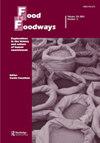反思:“它开阔了我们的眼界”:葡萄牙里斯本2019冠状病毒病大流行期间的民族志遭遇
IF 1.1
Q2 ANTHROPOLOGY
引用次数: 1
摘要
2020年和2021年,人类学家在全球COVID-19大流行期间面临田野调查的障碍。几个月来,我们和其他人一起忍受隔离,为失去许多人认为我们职业身份的基础——参与观察——而悲伤。我们无法预测,在大流行期间,我们的方法工具需要扩展和缩小多少,才能跟上公共卫生限制的步伐。我们不断地问自己:什么是人种学?我们现在该如何做我们的工作?为了解决这种方法上的困境,本文介绍了2020年夏季在里斯本大都会区进行的一项民族志调查,以展示几家小规模农业企业如何在封锁期间为受限制的城市居民提供食物。尽管规划政策中几乎没有考虑到这些农民的交易,但他们在领土上运作,从内部改变了粮食系统。本文还介绍了在大流行期间进行调查的利弊,以及在人种学知识建设中反身性的影响,即使我们的研究暂时需要数字化和远程完成。本文章由计算机程序翻译,如有差异,请以英文原文为准。
Reflection: “It opened our eyes”: ethnographic encounters during the COVID-19 pandemic in Lisbon, Portugal
Abstract In 2020 and 2021, anthropologists confronted the obstacles of conducting fieldwork during the global COVID-19 pandemic. For months, we endured quarantine with others and grieved the loss what many consider the basis of our professional identity: participant observation. We were unable to predict how much our methodological toolkit would have to stretch and shrink to keep up with public health restrictions during a pandemic. We repeatedly asked ourselves: what, in fact, is ethnography and how can we do our work now? To address such a methodological predicament, this paper presents an ethnographic investigation conducted in the Lisbon Metropolitan Area during the summer of 2020 to show how several small-scale agricultural businesses managed to feed confined city dwellers during lockdown. Although concerns for these farmers’ dealings are practically absent from planning policies, they operate in the territory, changing the food system from within. This article also presents the pros and cons of investigating during a pandemic and the implications of reflexivity in the construction of ethnographic knowledge, even if our research needs to be done digitally and remotely for the time being.
求助全文
通过发布文献求助,成功后即可免费获取论文全文。
去求助
来源期刊

Food and Foodways
ANTHROPOLOGY-
CiteScore
2.20
自引率
0.00%
发文量
16
期刊介绍:
Food and Foodways is a refereed, interdisciplinary, and international journal devoted to publishing original scholarly articles on the history and culture of human nourishment. By reflecting on the role food plays in human relations, this unique journal explores the powerful but often subtle ways in which food has shaped, and shapes, our lives socially, economically, politically, mentally, nutritionally, and morally. Because food is a pervasive social phenomenon, it cannot be approached by any one discipline. We encourage articles that engage dialogue, debate, and exchange across disciplines.
 求助内容:
求助内容: 应助结果提醒方式:
应助结果提醒方式:


